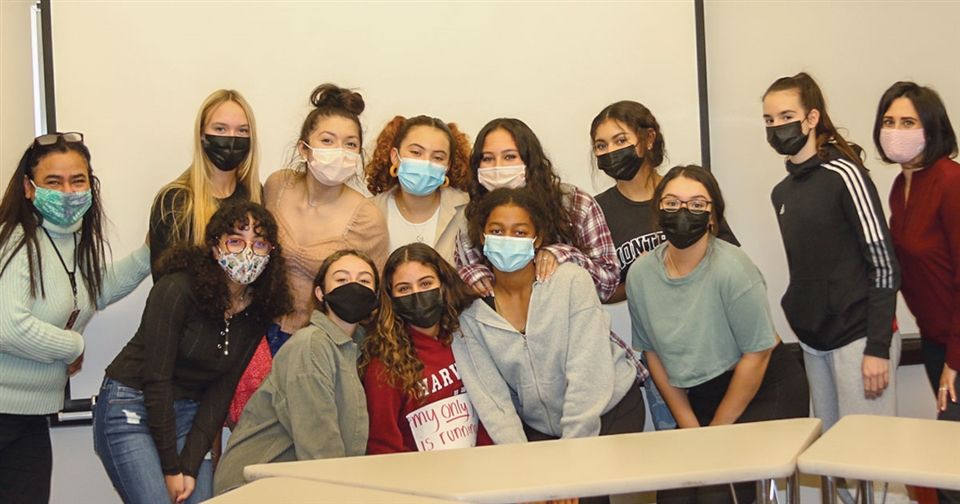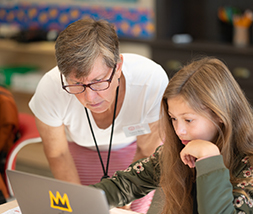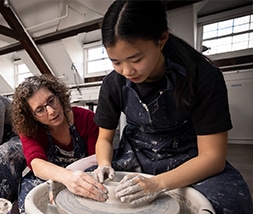From the library to dining, Hispanic Heritage Month (September 15 to October 15) became a part of the Winsor experience this fall.
The Virginia Wing Library got involved with a physical book display in the library and an Instagram project. “It was great to see almost all of those [books] get checked out,” said Danielle Smogard, the librarian behind Hispanic Heritage Month.
“It has been so rare to see my culture and community represented in the books we read in school,” said Katherine Torres ’22, dropping her backpack in a SOMOS meeting—Winsor’s Latinx affinity group meets during lunch (pictured). “I was overjoyed when I saw the library’s Hispanic Heritage Month book display! Representation is extremely important because it amplifies the voices and stories of all communities. When students can see themselves reflected positively in the media they consume, it shows us that we belong and makes us feel visible.” The SOMOS students made a point of discussing the representation in the lunch line, too.
Culinary Director Heather Pierce added a new section to the weekly menu—Celebrating Hispanic Heritage Month. Over the course of four meals, she transported faculty, staff, and students to Guatemala, Venezuela, Honduras, and Mexico.
One of Winsor’s longtime kitchen staff who is Guatemalan, Chef Julio Tello, inspired the menu of roasted chicken in tomatillo sauce, and chile rellenos stuffed with rice and quinoa. Another crowd favorite were the arepas from Venezuela that could be served “la domino” with black beans and cheese or “pabellon” with shredded beef, plus, the meal included “guasacaca,” an avocado cilantro sauce. The lunches were well received—“Arepas for life,” voted 79 students on Instagram.
In an Instagram post acknowledging the holiday and kicking off their daily posts, the Virginia Wing Library shared, “Hispanic Heritage Month is celebrated to recognize the many contributions Hispanic Americans have made and continue to make to the United States. It falls between the months of September and October because many Latin American countries declared independence during this time.”
The librarians were quick to caution that “Like all other months that shine a spotlight on a particular identity group, four weeks is not enough time to dive into the complexities of history, especially when a lot of people aren’t even sure what it means to be Hispanic.” Ms. Smogard herself shared, “I’m no expert, but my dad’s family is white and my mom’s family is from all over Spain, Cuba, Peru, and Colombia. Growing up, I always felt very confused about what my identity was.”
Using Instagram as a tool for further education, the library explained, “The word Hispanic refers to people who speak Spanish or are descendants from a Spanish-speaking population. A Latinx person is someone who is descended from Latin America. Often these terms are used interchangeably because of the history of Spanish colonization. But as we know, indigenous populations created rich civilizations with their own unique languages long before the Spanish ever arrived in South and Central America.”
According to Ms. Smogard, “Months that highlight specific identities are hard for librarians because obviously books by and about Hispanic and Latinx people are important every day—not just in September and October.” Acknowledging potential critics, she added, “I know some librarians at other schools who don’t do anything special for that very reason, but it also feels wrong to not do anything, especially when there are so many texts and authors that absolutely deserve an extra special spotlight.”
“As we talk about Hispanic Heritage Month, it’s important to remember that there is no single skin color, no single country, no single language, and no single story that defines what it means to be Hispanic or Latinx,” said the library in their Instagram post. This month we are excited to highlight stories that are diverse, flawed, joyful, painful, and beautiful. We hope you enjoy and learn from them.” The Instagram project featured an almost daily book recommendation including a plot summary and a few reflection questions. For example:
-
“What do you know about indigenous civilizations BEFORE they were colonized?”
-
“What does it mean to be the ‘land of the free’ when so many people are detained?”
-
“What are some of the most common portrayals of hispanic families that you see on TV or in books?”
-
“What lengths would you go to in order to protect your family?”
-
“Has anyone ever asked you ‘where you’re from’? Or have you ever asked someone that question?”
Following is the full list of books, organized chronologically:
Furia by Yamile Saied Méndez
Followers of the Virginia Wing Library on Instagram (@winsorvwlibrary) will recall seeing a similar program for Black History Month in February 2021.
“For initiatives like the Instagram series, and other similarly small acts of representation, I think it’s easy to think that they don’t matter if they don’t get a lot of attention,” said Ms. Smogard, “but I also think small things that could make just one person feel seen are important.”






